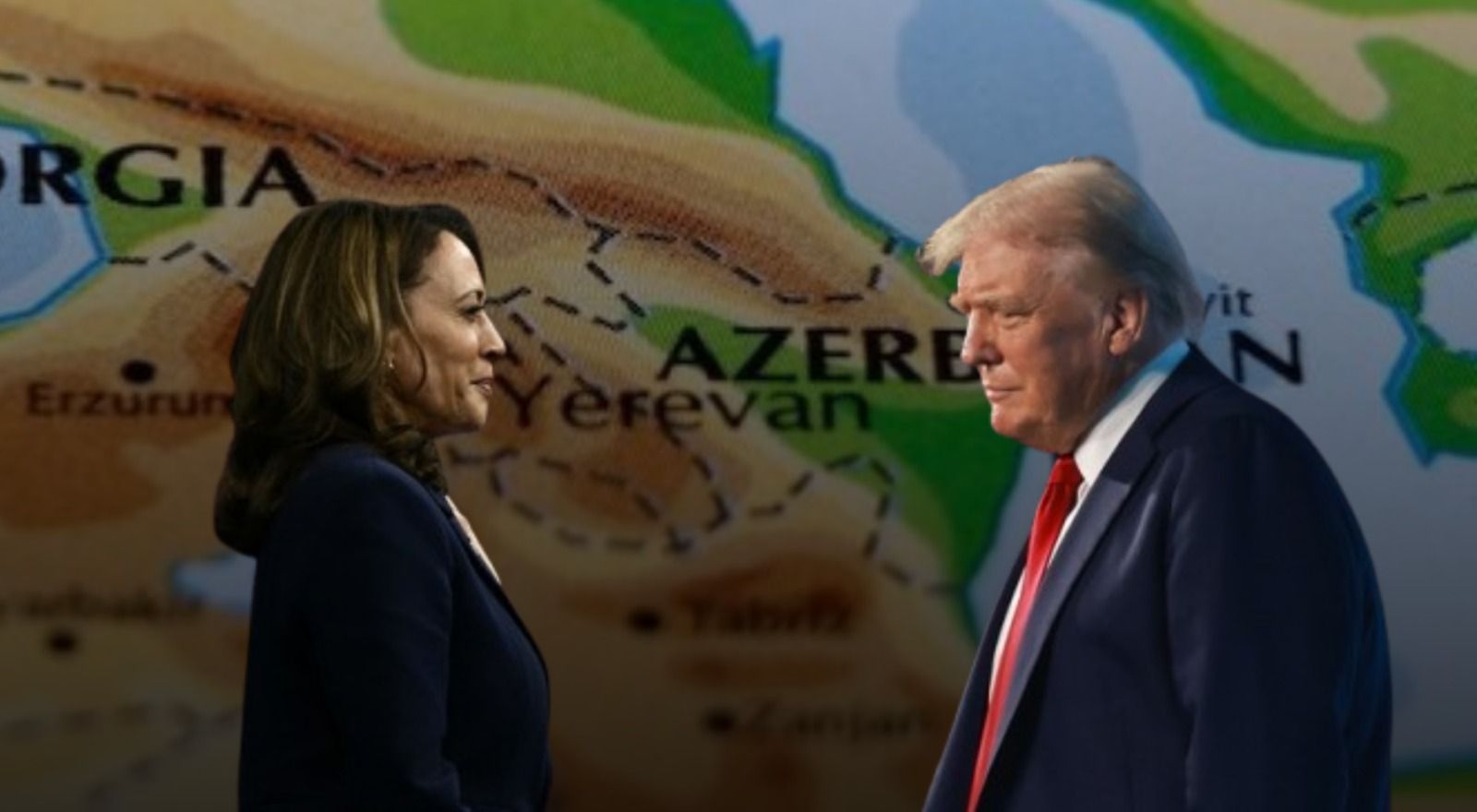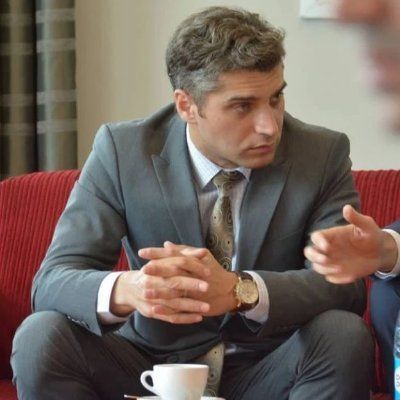US Presidential Elections: Fears of Armenian Lobby, possible multi-vector policy towards S Caucasus

The outcome of the U.S. presidential election holds significant potential to impact the Armenian Diaspora, a fact that many pro-Armenian politicians and lobbyists are keenly aware of. Speculations about Kamala Harris's potential favourability to Armenians, fuelled by Kim Kardashian's 100K USD donation, have sparked discussions about the influence of the Armenian community on the upcoming U.S. president. This prompts the question: Could Trump's policies pose a threat to the Armenian community?
Speaking to AZERNEWS, the US expert in the South Caucasus, Dr Frank Musmar, gave further insight into the political position and strategies of the candidates in the upcoming presidential elections in the United States. He also commented on what steps the Armenian diaspora will take in the future due to a president-elect.
"The Armenian Diaspora, a formidable force in the United States, is represented by numerous influential organizations. Notably, the Armenian Assembly of America (AAA), established in 1972, and the Armenian National Committee of America (ANCA), the largest and most influential Armenian American grassroots political organization, stand as a testament to the significant influence of this community.
The Armenian Diaspora is well-positioned in competitive election states. The largest and most established Armenian population flourishes across California (750,000 people); however, newer communities are growing in Phoenix, Arizona, and Nevada, as many moved to these states from California. Moreover, many Armenian communities extend from New Hampshire to Virginia and sizable communities across the mid-west to Michigan, Wisconsin, and Pennsylvania. While votes in California and Massachusetts may not sway the outcome much due to their usual blue-state status, Armenian votes in swing states like Nevada, Michigan, and Wisconsin can hold substantial importance during the pre-election period. In this regard, the Armenian votes in these states are vital for both Republicans and Democrats, making it essential to grasp the stance of the Armenian community on these elections.
According to Dr. Musmar, the Armenian lobby, which could not get what it wanted from the Biden administration, is currently hoping for Kamala Harris.
"The main topic that is most important to the Armenian Diaspora to cast their votes for either Party is condemning any U.S. complicity in what Armenia claims as Azerbaijan's genocide of Artsakh and its aggression against Armenia, arguing that the Biden Administration failed to support Armenia and Artsakh adequately, hold the Azerbaijani government accountable. The Diaspora met with pro-Armenian politicians and lobbyists of the Democratic Party, demanding Kamala Harris promise to agree on the 3 points mentioned above for their support in the election," Dr Musmar said.
However, according to the pundit, for the United States, foreign policy, democracy, human rights, energy, and security are believed to be the three central pillars of the U.S. South Caucasian policy.
"Due to the State's interest in transporting possibilities of the Caspian basin's energy resources to Western markets, energy will remain the main priority. Moreover, a continuation of certain inertia, the non-active policy will be preserved under Trump, the most expected to win the election, as he is famous for his declarations and practical approaches regarding decreasing U.S. interference in other countries, especially domestic affairs," he added.
Regarding Trump's relationship with Azerbaijan, the political expert said that after Trump's election as president for the second time, the United States may intervene less in the South Caucasus.
"Under a potential second Trump administration, we see reduced U.S. interference in the South Caucasus. Among the three countries in the region, Georgia could be the most affected by this policy, as it has traditionally relied on active Western, mainly American, support.
Azerbaijan-US relations are expected to flourish during Trump's second presidency as it corresponds to Trump's non-interference policy agenda. A less active policy of the U.S. in the region will have less interest in Armenia's pro-Western rhetoric during Prime Minister Nikol Pashinyan.
Accordingly, Azerbaijan will gain more economic interest to attract more Western and American partners and investments in its oil and gas, especially given the considerably decreased Russian contribution caused by the anti-Russian sanctions and the Ukrainian war.
The Iranian factor is another essential factor that will play a specific role in the South Caucasus region. In the second of Trump's presidency, the U.S. withdrew again from the Iran nuclear deal, and the imposition of significant U.S. economic sanctions against Iran is apparent, which will bring Azerbaijan a strong security partner for Israel and the USA on Iran's borders.
Under a potential second Trump administration, the U.S. is likely to engage more with some countries in the South Caucasus and disengage with others. The deterioration of business or other relations with Iran from Armenia and Georgia is evident. These South Caucasian countries could potentially lose more than they gain, as they may not receive adequate compensation from the U.S. for the loss of their business projects with Iran. However, this situation could present a golden opportunity for Azerbaijan to gain momentum and secure better energy and security deals with the new Trump administration," he said.
Touching on the processes related to the region, especially the Ukraine-Russia war, the expert also emphasized the possibility that the war will subside if Trump is elected president. However, it is inevitable that there will be certain conditions in front of the Kremlin.
"Donald Trump has repeatedly said he could settle the war
between Russia and Ukraine in one day if he is elected president
again. Two key advisers to Donald Trump have presented him with a
plan to end Russia's war in Ukraine that involves telling Ukraine
it will only get more U.S. weapons if it enters peace talks and, at
the same time, warn Moscow that any refusal to negotiate would
result in increased U.S. support for Ukraine. The proposed plan
includes a ceasefire based on prevailing battle lines during peace
talks and Moscow accepting to discuss NATO membership for Ukraine.
Republicans and Trump supporters are reticent about paying for more
resources for Ukraine under the plan. The U.S. has spent more than
$70 billion on military aid for Ukraine since the war started.
However, during a podcast interview last week, Trump ruled out
committing U.S. troops to Ukraine and appeared skeptical of making
Ukraine a NATO member. He has indicated he would quickly move to
cut aid to Kyiv if elected, a stance that could significantly
impact the ongoing conflict."
Talking about the multi-vector policy of the USA, Dr. Frank Musmar drew attention to the situation in the Middle East at the same time. There are even many experts who think that the Biden administration is indispensable in solving the Middle East crisis.
Besides, the potential reshaping of the Middle East crisis under
Trump's presidency is a topic of significant interest and
anticipation. During his first term, Trump's pro-Israel stance
significantly altered the dynamics of the region.
"During his first term, Trump was one of the most pro-Israel U.S.
presidents. He recognized Israel's controversial annexation of the
Golan Heights and the country's capital as Jerusalem, even though
control of Jerusalem has been a sticking point in negotiations
between the Israelis and Palestinians for decades.
This tarnished the U.S.'s ability to act as a credible broker of negotiations between the Israelis and Palestinians, who have increasingly sought diplomatic solutions outside of the peace process. Nevertheless, Trump has continued to boast of those measures as proof of his pro-Israel bona fides.
Though he has not elaborated on his plans for a second term,
there is reason to believe that he would advance similar policies,
with his son-in-law and former Middle East adviser, Jared Kushner,
recently suggesting that Gaza's current borders can be altered in
contradiction of current U.S. policy. This could potentially
reshape the Middle East crisis, particularly the situation in Gaza.
"Gaza's waterfront property could be precious," he said in
February.
That said, it is notable that Trump has not highlighted the war as
a top campaign trail issue. Furthermore, that is likely because he
senses where the electorate is at. The fact remains that the war in
Gaza is not a determinative electoral issue for the vast majority
of voters, and even Republicans have soured on it: A majority now
support a permanent ceasefire and de-escalation of violence, even
as they still hold favourable views of Israel," he concluded.
---
Follow us on Twitter @AzerNewsAz
Here we are to serve you with news right now. It does not cost much, but worth your attention.
Choose to support open, independent, quality journalism and subscribe on a monthly basis.
By subscribing to our online newspaper, you can have full digital access to all news, analysis, and much more.
You can also follow AzerNEWS on Twitter @AzerNewsAz or Facebook @AzerNewsNewspaper
Thank you!

